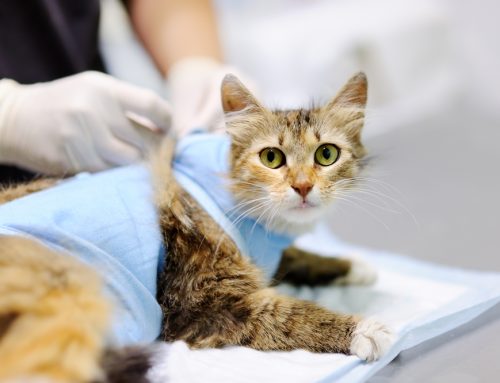February is National Pet Dental Health Month and the perfect time to brush up on—no pun intended—your pet’s oral health. The truth is, oral health is an area many pet owners forget about until their veterinarian gently explains that their pet has serious dental issues that could be causing them a great deal of pain. Our El Paso Animal Hospital team wants pet owners to feel comfortable taking control of their pet’s dental health. Take our short true or false quiz to test your knowledge—you might be surprised at some of the answers!
True or False? Your pet’s bad breath is normal
FALSE — While some odor is normal, the smell of your pet’s breath should not be so strong that it could knock you over. Bad breath is often an early indication of dental disease, along with these signs:
- Brown or yellow tartar buildup on their teeth
- Red, swollen gums
- Broken or loose teeth
- Decreased appetite
- Swallowing food whole, instead of chewing
- Blood in their water bowl or on their toys
- Shying away from being touched near their face
- Unexplained grumpiness
If you recognize these signs in your pet, schedule a dental evaluation with your veterinarian to assess their dental health and address any problems.
True or False? Dental disease mainly affects senior pets
FALSE — By the age of 3, most dogs and cats have some degree of dental disease. Without preventive care or treatment, it can lead to loose teeth and infection, causing your pet significant pain.
Prevention is key when it comes to protecting your pet from dental disease. Regularly brushing your pet’s teeth is the best way to keep their teeth healthy. Daily brushing is preferred, but a few times a week is better than nothing. Here are some tips to get started:
- Choose a child’s toothbrush or a finger brush and veterinary-approved, flavored toothpaste. Avoid human toothpaste; it contains fluoride that is unsafe for pets if swallowed. C.E.T.® Enzymatic Toothpaste is an El Paso veterinarian favorite, and is available as an affordable option available at our hospital.
- Let your pet lick the toothpaste from your finger, and give them a treat and praise.
- Rub your finger over your pet’s tooth surfaces, then repeat with the toothbrush. Focus on the outer surfaces only—your pet’s tongue will take care of the inner surfaces.
- Positively reinforce teeth brushing by following it up with praise, a special treat, or a fun activity.
In addition to regular brushing, your veterinarian can recommend effective dental products and treats to help keep your pet’s teeth clean. Your pet should have their teeth and gums examined annually by their veterinarian to look for early signs of dental disease.
True or False? Dental disease affects more than your pet’s teeth
TRUE — Dental disease is caused by oral bacteria that deposit plaque on your pet’s teeth. The plaque hardens into tartar in 24 hours unless regularly brushed away, which is why daily brushing is so important. Dental disease can cause problems that extend far beyond your pet’s teeth. Potential issues include:
- Kidney, heart, and liver problems — Bacteria from plaque and tartar buildup can leak into your pet’s bloodstream, causing damage to these essential organs.
- Tooth-root infections — These occur most commonly in the large, three-rooted carnassial teeth on the upper jaw.
- Under-eye swelling — Tooth-root abscesses can cause a pus-filled swelling below the eye that may be confused with an eye or facial problem.
True or False? Your pet may be hiding dental pain

TRUE — Unfortunately, your pet can’t verbalize when they are in pain, and it can be difficult to know when they are suffering. Because your pet’s pain increases from mild to severe over an extended period of time, you may not notice the ways they overcompensate. The following behaviors may indicate your pet is experiencing dental-related pain:
- Chewing on one side of the mouth
- Taking food from their bowl and eating it somewhere else
- Leaving broken crumbs around their bowl after eating
- Swallowing food whole
- Avoiding being touched near their head
The bacteria from plaque and tartar can move below the gumline, attacking the periodontal ligaments that anchor the teeth in their bony sockets. Periodontal inflammation and infection eventually lead to ligament breakdown, and the affected tooth roots become infected and loose, causing significant pain for your pet.
Your pet’s dental health is about so much more than keeping their breath minty fresh. As we celebrate National Pet Dental Health Month, we hope we have given you the tools you need to keep your pet pain-free and dental disease-free. Contact our El Paso Animal Hospital team at 316-788-1000 x146 to schedule your pet’s dental today.







Leave A Comment